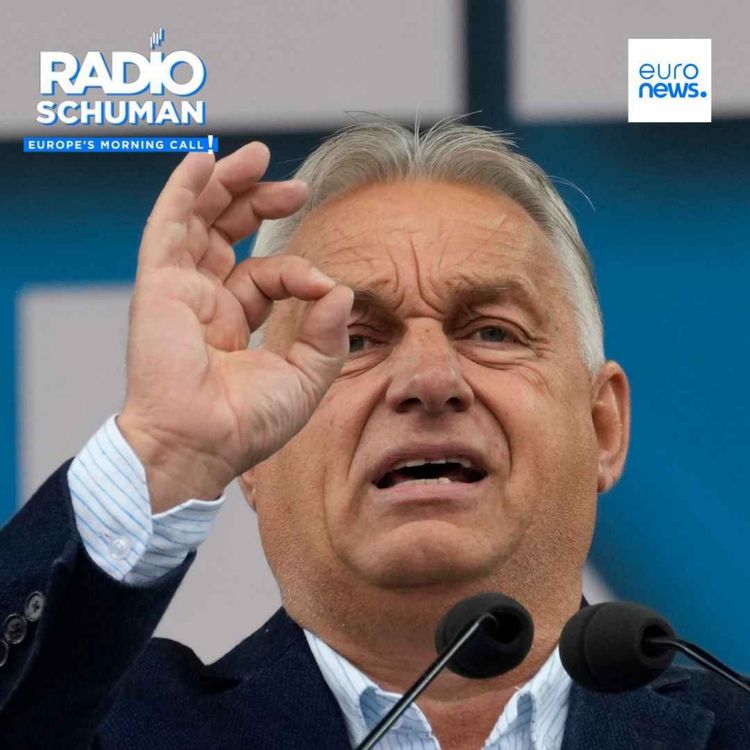Share

Radio Schuman
The EU Has Lost Patience With PM Orbán. What Can It Do With Hungary Now?
Halfway through its six-month rotating presidency, rather than playing the honest broker, Budapest has blocked many files, including the ones on aid to Ukraine.
It further blocked a statement denouncing Moscow's media ban, and it voted against the EU’s plan to impose tariffs on electric vehicles.
It's unclear what exactly broke the camel's back, but one thing is certain: the EU has lost its patience with Hungary.
Yet on Tuesday, at a press conference ahead of this speech in Parliament, Orbán played the now-traditional martyr card at a press conference before his big speech in front of all MEPs, arguing that he's not the problem — it is Brussels that needs to change its strategy on Ukraine, migration and competitiveness.
So, what can the EU do now with Hungary? We ask Daniel Hegedüs, the German Marshall Fund's regional director for Central Europe.
Coming up on Wednesday’s EU agenda, Radio Schuman will dive into the latest developments on the G7's proposed $50 billion (€45 billion) loan to Ukraine — will we see further progress?
Over in Strasbourg, MEPs are set for a lively debate on several key issues, including a G20 proposal to tax the world’s wealthiest individuals, strengthening the security of Europe’s external borders, and ensuring decent and affordable housing for all citizens.
And lastly, have you ever wondered if MEPs get to skip the airport lines? Or what benefits do they have? Short answer: the European Parliament does not issue passports with diplomatic status for MEPs, but they can have a "laisser-passez" travel document when going on parliamentary business.
Radio Schuman is hosted and produced by Maïa de la Baume, with journalist and production assistant Paula Soler, audio editing by Zacharia Vigneron and music by Alexandre Jas.
Europe Today is Euronews’ daily podcast hosted by Maria Tadeo and Méabh Mc Mahon, broadcasting directly from Brussels, at the heart of Europe.
Every morning, we deliver the top and exclusive stories shaping the European Union (EU) and beyond.
Stay ahead with the key news and insights that matter in Europe today.
More episodes
View all episodes

49. Putin "never wants" peace, says 5th Georgian president
20:12||Season 3, Ep. 49On Europe Today, your daily Euronews podcast, presented by Méabh Mc Mahon we speak to Salomé Zourabichvili, a Georgian politician who served as the president of Georgia from 2018 to 2024, the first female to take on this role. Our correspondent Maïa de la Baume brings us the latest in the backlash the Commissioner for the Mediterranean has recieved from the EU countries for her participation in Trump's Board of Peace. We travel to Lisbon to speak to our correspondent João Azevedo about the racism suffered by the Real Madrid player Vinicius Junior in a Champions League match.
48. Is the EU-US relationship really going better? We ask the US ambassador to the EU
19:33||Season 3, Ep. 48On Europe Today, your daily Euronews podcast, presented by Méabh Mc Mahon we speak to Andrew Puzder, US ambassador to the EU about the latest in the relationship between the EU and the US. We also welcome in our studio the new president of the European Economic and Social Committee, Séamus Boland. Our Ukraine correspondent, Sasha Vakulina, updates us in the latest developments in the peace negotiations in Geneva.
47. Want to work for the European Union? Apply now!
19:59||Season 3, Ep. 47On Europe Today, your daily Euronews podcast, presented by Méabh Mc Mahon, we look ahead to the peace talks resuming in Geneva today nearly four years after Russia’s invasion of Ukraine. With pressure from Donald Trump and doubts raised by Marco Rubio, are negotiations moving forward — or nowhere at all? We also have an update on Emmanuel Macron’s visit to India just three weeks after the EU’s landmark deal with New Delhi. And in Hungary, Viktor Orbán faces mounting pressure from challenger Péter Magyar as US backing enters the campaign. Finally, we bring you up to speed on the Epso exam required to get a job in the EU.
46. The "world ahead is made of many differences" says Pothier over the EU-US relationship
19:17||Season 3, Ep. 46On Europe Today, your daily Euronews podcast, presented by Mared Gwyn, we get you up to date over what happened this weekend at the Munich Security Conference with our EU editor Maria Tadeo. We also speak with Fabrice Pothier, CEO of Rasmussen Global and our Defence reporter, Alice Tidey, helps us explore the debate over an European nuclear umbrella. We then cross to Berlin with our correspondent Laura Fleischmann to speak over the controversial jury comments at the Berlinale Film Festival.
From Brazil to Brussels: What's the beef with the Mercosur trade deal?
07:27|Which EU leader would you choose for a dinner date this Valentine's Day? And is the EU-Mercosur deal as big an opportunity as it has been portrayed?To discuss these topics, we sat down with Pedro Miguel da Costa e Silva, Brazil’s ambassador to the EU, Adélaïde Charlier, Belgian climate and human rights activist and Teresa Küchler, European correspondent for Swedish daily Svenska Dagbladet.This is an extract from the weekly Euronews podcast Brussels, My Love?.To continue listening, visit the Brussels, My Love? feed on your favourite podcast app.You can also find us on YouTube and on our website.
45. "It's the year to save cars", says European Parliament president Roberta Metsola
19:37||Season 3, Ep. 45On Europe Today, your daily Euronews podcast, presented by Méabh Mc Mahon we speak in an exclusive interview with European Parliament president Roberta Metsola at the Belgian castle where EU leaders met yesterday. We also speak with European Commissioner for Sports, Glenn Micallef, about the disqualification of an Ukranian athlete at the Winter Olympics over a helmet picturing dead ukranian athletes. We also travel to Munich to our EU news editor Maria Tadeo ahead of the Munich Security Conference.
44. Hungarian election campaign heats up with sex tape blackmail
19:00||Season 3, Ep. 44On Europe Today, your daily Euronews podcast presented by Méabh Mc Mahon, we cover the latest from today’s EU leaders’ retreat in the Belgian countryside and look at the possibility of fresh elections in Ukraine. We’re joined by former Greek finance minister Yannis Varoufakis and we get an update on the Hungarian election campaign’s dirty laundry from our correspondent, Sándor Zsíros.
43. EU leaders draw their battle lines ahead of EU summit
19:42||Season 3, Ep. 43On today’s Europe Today, we dive into the tensions that are rising over the future of the European economy as EU leaders prepare for a crucial retreat in Belgium. French President Emmanuel Macron calls it a moment of truth for the EU, pushing for new common EU debt — while Germany’s Friedrich Merz firmly resists. Is there a compromise in sight? From Strasbourg, European Commission President Ursula von der Leyen addresses MEPs ahead of high-stakes talks with industry leaders in Antwerp. We break down the political signals and what they mean for Europe’s economic direction. We also break down the European Parliament votes on stricter asylum rules, paving the way for easier deportations to countries outside the EU.
42. You've got mail - EU leaders receive stark letter from Brussels
19:30||Season 3, Ep. 42European leaders are heading into a make-or-break week. Ahead of a crucial summit, EU capitals have received a blunt message from Brussels: fix the single market, slash red tape, and accept that Europe may have to move at different speeds — or risk falling behind. In this episode, we head to Strasbourg to join our EU editor Maria Tadeo on why deep political divisions could still derail reform. In Berlin, we look at the growing alliance between Germany’s new chancellor Friedrich Merz and Italy’s Giorgia Meloni — is this a power couple shaping Europe’s future, and what does it mean for the traditional Franco-German engine?We also turn to Ukraine, as new diplomatic talks raise hopes — and questions — about a possible end to the war, with a US-backed June deadline now on the table. And finally, how a 14-minute Super Bowl performance by Bad Bunny has unexpectedly sparked political debate across Europe.